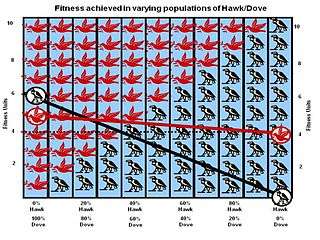
Evolutionary models assume that people choose their strategies through a trial-and-error learning process in which they gradually discover that some strategies work better than others. In games that are repeated many times, low-payoff strategies tend to be weeded out, and an equilibrium may emerge. - Larry Samuelson, 1997.
Evolutionary game theory (EGT) is the application of game theory to evolving populations of lifeforms in biology. In this context it defines a framework of contests, strategies, and analytics into which Darwinian competition can be modelled. It originated in 1973 with John Maynard Smith and George R. Price's formalisation of the way in which such contests can be analysed as "strategies" and the mathematical criteria that can be used to predict the resulting prevalence of such competing strategies.
Quotes
- Evolutionary game theory originated as an application of the mathematical theory of games to biological contexts, arising from the realization that frequency dependent fitness introduces a strategic aspect to evolution. Recently, however, evolutionary game theory has become of increased interest to economists, sociologists, and anthropologists--and social scientists in general--as well as philosophers.
- J. McKenzie Alexander, "Evolutionary game theory." Stanford encyclopedia of philosophy (2010).
- Ever since Darwin read Malthus, the theory of evolution has benefited from the interaction of ecology with economics. Evolutionary game theory belongs to this tradition: it merges population ecology with game theory.
- Karl Sigmund and Martin A. Nowak. "Evolutionary game theory." Current Biology 9.14 (1999): R503-R505.
- Evolutionary game theory is one of the most active and rapidly growing areas of research in economics. Unlike traditional game theory models, which assume that all players are fully rational and have complete knowledge of details of the game, evolutionary models assume that people choose their strategies through a trial-and-error learning process in which they gradually discover that some strategies work better than others. In games that are repeated many times, low-payoff strategies tend to be weeded out, and an equilibrium may emerge.
- Larry Samuelson. Evolutionary Games and Equilibrium Selection. 1997. Overview.
- Evolutionary game theory is a way of thinking about evolution at the phenotypic level when the fitnesses of particular phenotypes depend on their frequencies in the population.
- John Maynard Smith, Evolution and the Theory of Games (1973) p. 1.
- Current evolutionary game theory — where ideas from evolutionary biology and rationalistic economics meet — emphasizing the links between static and dynamic approaches and noncooperative game theory.
- Jörgen W. Weibull. Evolutionary game theory. MIT press, 1997. Introduction
External links
This article is issued from
Wikiquote.
The text is licensed under Creative
Commons - Attribution - Sharealike.
Additional terms may apply for the media files.